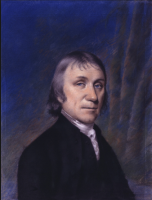










Joseph Priestley was an 18th-century English theologian, Dissenting clergyman, natural philosopher, chemist, educator, and Liberal political theorist who published over 150 works. He is usually credited with the discovery of oxygen, having isolated it in its gaseous state, although Carl Wilhelm Scheele and Antoine Lavoisier also have a claim to the discovery.
During his lifetime, Priestley's considerable scientific reputation rested on his invention of soda water, his writings on electricity, and his discovery of several "airs" (gases), the most famous being what Priestley dubbed "dephlogisticated air" (oxygen). However, Priestley's determination to defend phlogiston theory and to reject what would become the chemical revolution eventually left him isolated within the scientific community.
Priestley's science was integral to his theology, and he consistently tried to fuse Enlightenment rationalism with Christian theism.In his metaphysical texts, Priestley attempted to combine theism, materialism, and determinism, a project that has been called "audacious and original".He believed that a proper understanding of the natural world would promote human progress and eventually bring about the Christian Millennium.Priestley, who strongly believed in the free and open exchange of ideas, advocated toleration and equal rights for religious Dissenters, which also led him to help found Unitarianism in England. The controversial nature of Priestley's publications combined with his outspoken support of the French Revolution aroused public and governmental suspicion; he was eventually forced to flee, in 1791, first to London, and then to the United States, after a mob burned down his home and church. He spent the last ten years of his life living in Northumberland County, Pennsylvania.
A scholar and teacher throughout his life, Priestley also made significant contributions to pedagogy, including the publication of a seminal work on English grammar, books on history, and he prepared some of the most influential early timelines. These educational writings were some of Priestley's most popular works. It was his metaphysical works, however, that had the most lasting influence: leading philosophers including Jeremy Bentham, John Stuart Mill, and Herbert Spencer credit them among the primary sources for utilitarianism.
Early life and education (1733–55)
Priestley was born to an established English Dissenting family (i.e. they did not conform to the Church of England) in Birstall, near Batley in the West Riding of Yorkshire. He was the oldest of six children born to Mary Swift and Jonas Priestley, a finisher of cloth. To ease his mother's burdens, Priestley was sent to live with his grandfather around the age of one. He returned home, five years later, after his mother died. When his father remarried in 1741, Priestley went to live with his aunt and uncle, the wealthy and childless Sarah and John Keighley, 3 miles (4.8 km) from Fieldhead.Because Priestley was precocious—at the age of four he could flawlessly recite all 107 questions and answers of the Westminster Shorter Catechism—his aunt sought the best education for the boy, intending him for the ministry. During his youth, Priestley attended local schools where he learned Greek, Latin, and Hebrew.
Around 1749, Priestley became seriously ill and believed he was dying. Raised as a devout Calvinist, he believed a conversion experience was necessary for salvation, but doubted he had had one. This emotional distress eventually led him to question his theological upbringing, causing him to reject election and to accept universal salvation. As a result, the elders of his home church, the Independent Upper Chapel of Heckmondwike, refused him admission as a full member.
Priestley's illness left him with a permanent stutter and he gave up any thoughts of entering the ministry at that time. In preparation for joining a relative in trade in Lisbon, he studied French, Italian, and German in addition to Aramaic, and Arabic. He was tutored by the Reverend George Haggerstone, who first introduced him to higher mathematics, natural philosophy, logic, and metaphysics through the works of Isaac Watts, Willem 's Gravesande, and John Locke.
Although Priestley claimed that natural philosophy was only a hobby, he took it seriously. In his History of Electricity, he described the scientist as promoting the "security and happiness of mankind".Priestley's science was eminently practical and he rarely concerned himself with theoretical questions; his model was Benjamin Franklin. When he moved to Leeds, Priestley continued his electrical and chemical experiments (the latter aided by a steady supply of carbon dioxide from a neighbouring brewery). Between 1767 and 1770, he presented five papers to the Royal Society from these initial experiments; the first four papers explored coronal discharges and other phenomena related to electrical discharge, while the fifth reported on the conductivity of charcoals from different sources. His subsequent experimental work focused on chemistry and pneumatics.
Priestley published the first volume of his projected history of experimental philosophy, The History and Present State of Discoveries Relating to Vision, Light and Colours (referred to as his Optics), in 1772.He paid careful attention to the history of optics and presented excellent explanations of early optics experiments, but his mathematical deficiencies caused him to dismiss several important contemporary theories. Furthermore, he did not include any of the practical sections that had made his History of Electricity so useful to practising natural philosophers. Unlike his History of Electricity, it was not popular and had only one edition, although it was the only English book on the topic for 150 years. The hastily written text sold poorly; the cost of researching, writing, and publishing the Optics convinced Priestley to abandon his history of experimental philosophy.
Priestley was considered for the position of astronomer on James Cook's second voyage to the South Seas, but was not chosen. Still, he contributed in a small way to the voyage: he provided the crew with a method for making soda water, which he erroneously speculated might be a cure for scurvy. He then published a pamphlet with Directions for Impregnating Water with Fixed Air (1772).Priestley did not exploit the commercial potential of soda water, but others such as J. J. Schweppe made fortunes from it.In 1773, the Royal Society recognised Priestley's achievements in natural philosophy by awarding him the Copley Medal.
Priestley's friends wanted to find him a more financially secure position. In 1772, prompted by Richard Price and Benjamin Franklin, Lord Shelburne wrote to Priestley asking him to direct the education of his children and to act as his general assistant. Although Priestley was reluctant to sacrifice his ministry, he accepted the position, resigning from Mill Hill Chapel on 20 December 1772, and preaching his last sermon on 16 May 1773.
The Royal Society recognised Priestley's achievements in natural philosophy by awarding him the Copley Medal.